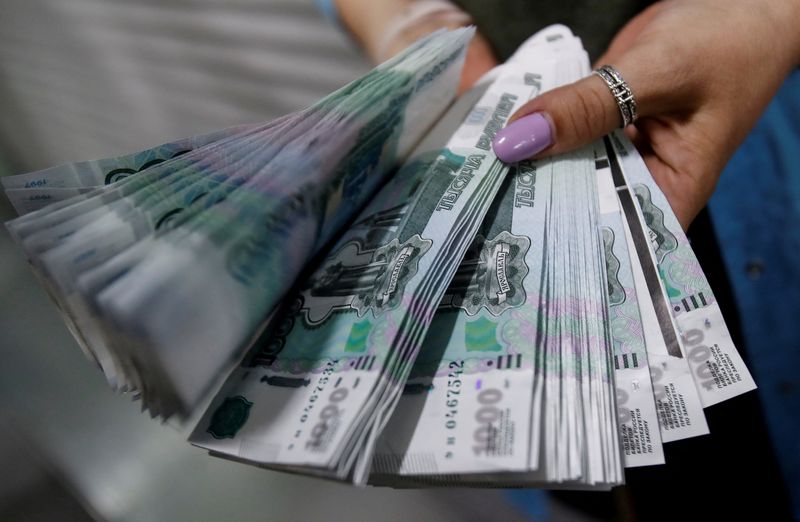(Reuters) -Russia's battered rouble was given a reprieve with this week's emergency 350-basis-point rate hike to 12% but further action is likely to be needed for a more lasting impact.
The Russian currency has lost more than a fifth of its value since Russia invaded Ukraine in February 2022 and tumbled past the symbolic threshold of 100 per dollar on Monday.
The impact of sanctions in reduced export revenues and higher import costs has contributed to rouble weakening, as has Moscow's sharply increased spending on its military to prosecute its war in Ukraine.
With accelerating inflation causing prices for basic goods to rise and a presidential election approaching in March 2024, the rouble's fate is a sensitive subject for Russian authorities.
The surest way to stabilise the rouble would be for Russia to withdraw its troops from Ukraine and cut back on soaring military spending, but assuming Moscow does not take those steps, here are some things Russia may try:
1. HIKE RATES AGAIN
One available option would be to hike rates again. Last year's key rate increase to 20% calmed markets down and supported the rouble before capital controls started to take hold.
But higher borrowing costs squeeze economic growth prospects and make life harder for companies and, in particular, the government as it finances military operations in Ukraine.
The finance ministry has said that lower rates would ease pressure on the budget deficit and its financing needs.
Furthermore, future hikes are unlikely to deter ongoing capital outflows, UBP said in a note.
"Higher interest rates will merely slow the pace of rouble depreciation."
2. CAPITAL CONTROLS
Russian authorities are discussing bringing back the compulsory sale of foreign currency revenues for exporters, five sources familiar with the matter told Reuters on Wednesday, among other capital control measures that should buttress the rouble.
One source said four measures were being considered:
* Exporters returning up to 90% of export revenues to Russia.
* Exporters who do not comply with this losing access to government support.
* Bans on dividends and loans being paid abroad, including in jurisdictions that Russia considers "friendly".
* Ban on import subsidies.
Russia ordered exporters to convert 80% of FX revenues last year to support financial stability, which ultimately pushed the rouble to a more than seven-year high in June 2022.
Sources said that if the rouble does not show signs of improving by Friday, capital controls could be reintroduced.
3. REDUCE LIQUIDITY SURPLUS
The remaining options may be too limited in scope to make a large difference, but the central bank does have other tools at its disposal.
It could try to reduce the rouble liquidity surplus by raising banks' reserve requirements, thereby reducing the money supply that could be exchanged to foreign currency.
The Bank of Russia has shown that it is not indifferent to rouble volatility and the prospect of new steps to curb devaluation will at least temporarily weaken foreign currency demand, said Promsvyazbank analysts.
The central bank has already said it will stop holding one-year repo, or repurchase agreement, auctions that help banks manage their liquidity. Banks currently owe the central bank 1.28 trillion roubles ($13.46 billion) as a result of these auctions.
Deputy Governor Alexei Zabotkin said the decision to stop repo auctions was not tied to the rouble's weakening and merely a coincidence.
4. FX INTERVENTIONS
One way to defend the rouble is for Russia to sell foreign currency from its National Wealth Fund (NWF). After a months-long hiatus, Russia resumed FX interventions in January, selling China's yuan.
Russia tried to switch to FX purchases in August, but that was swiftly aborted, with Russia effectively abandoning its own budget rule as the rouble fell.
However, selling large amounts of foreign currency would deplete Moscow's FX reserves. Sanctions have frozen around half of Moscow's pre-war pile of more than $600 billion in FX.
Zabotkin last week said that the bank would take that step as and when it was deemed necessary.
5. INCREASE OIL EXPORTS
Analysts from Alfa Bank on Tuesday said Russia's decision to limit oil exports to support global prices is the structural reason behind the weak rouble.
Moscow is extending an oil export cut into September, with next month's oil exports to be slashed by 300,000 barrels per day.
Russia's oil and gas exports are down sharply this year, primarily due to a Western oil price cap and embargo. Other markets have opened up for Russia, but Moscow is forced to sell at a discount.
Any increase in supply would see global prices fall.
6. CREATIVE TAXES
A more outlandish option could be to impose new taxes on foreign currency transactions, as proposed on Tuesday by a lawmaker in the lower house of parliament, the State Duma.
Duma lawmaker Vladimir Koshelev proposed taxing FX transactions on the stock market and tightening the regulation of profits in foreign currency.

The Interfax news agency quoted a source as saying that authorities had discussed a new excess profit tax for those exporters that refuse to cooperate with returning revenues.
($1 = 95.1310 roubles)